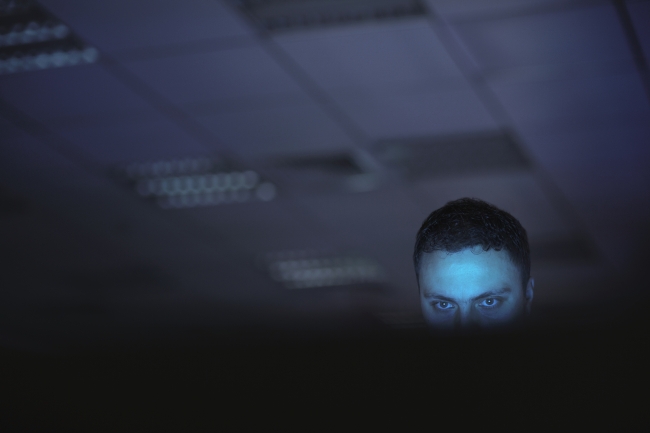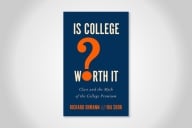You have /5 articles left.
Sign up for a free account or log in.

istockphoto.com/FangXiaNuo
When people face extreme pressure, their decision making and ability to act in good faith often suffers.
Make no mistake: today’s online students are under intense pressure to perform in their courses, juggling busy schedules and family lives with earning a reputable degree to boost their job prospects. Combine these stressors with the anonymity afforded through online interactions, as well as the commonality of cheating, and the importance of ensuring academic integrity in online programs is undeniable.
The online testing industry has seen explosive growth. Academic programs want to maintain the integrity of the exam and the entire degreed program. The threat to that integrity is real. According to Educational Testing Service research, 73 percent of all test takers, including graduate students and teachers, agree that most students cheat at some point in their academic careers.
The phigital generation -- those unwilling or unable to distinguish between the physical world and its digital likeness -- demand the same technology and flexibility in online education as they experience in other aspects of their lives.
Early in my career in education technology, I saw a need to maintain online exam integrity and address those needs. This challenge served as a catalyst for developing a system to establish student identity and a secure testing environment. I proctored our first exam 10 years ago, and the goals were the same as they are now: to recreate the face-to-face testing experience and improve the way people take exams online.
Having now been involved with proctoring over four million exams for over 1,000 colleges, universities and certifying organizations, we are still having basic conversations and answering a fundamental question from a minority of test takers: Is it really necessary to have a proctor monitor me online while I take an exam?
To help answer that question, here are five examples of how we’ve caught cheaters this past decade.
- We’ve seen people attempt to hide their friends in the closet or under the desk.
- We’ve busted look-alikes trying to take exams for others in exchange for cash.
- We caught a student using mirrors and drones in an attempt to steal exam questions.
- Students have written answers on the inside labels of water bottles, stuck Post-it notes on their dogs, worn tiny earbuds with microphones to collude with others, hidden people under blankets in their rooms and written answers on the ceiling.
- Some students have even used two cellphones, so they can put one away when the proctor requests it and still have one available to google exam questions.
The challenge our industry faces to protect all test takers from those who intend to cheat online is that would-be cheaters have an unlimited amount of time to prepare their plan. They can modify their environment, modify the computer, insert unpermitted resources in locations that are hard to find, enlist the support of like-minded friends or use paid cheating sites. On the other hand, proctors have only 10 to 12 minutes to instruct the test taker on the rules of the exam, review the testing environment, check the computer and wish them good luck. Despite these challenges, the benefits are worth the work to secure the exam process and maintain program credibility for online learners.
Our data show that more than 30 percent of all test takers bring an unpermitted resource to their exam. Without proctor supervision, almost 600,000 items would have gone unnoticed before an exam in 2017 alone. These materials include class notes, scratch paper, a calculator or another unauthorized element. Proctors play a vital role in leveling the playing field among all test takers by identifying which items are permitted or prohibited, and requesting that such materials to be removed.
The alternative to online proctoring, traditional campus-based testing, has its own challenges. Institutions have shared with us how cumbersome rules regarding the process to turn in a classroom cheater can make some instructors debate whether it’s worth the effort. Some have rules stating that an administrator must enter the room and observe the cheating for themselves, but the same organization has rules saying the instructor is unable to leave the room unattended to go get the administrator.
While some critics call online proctoring invasive, the process is not much different than the norm in classrooms around the world. Our recommendation to institutional partners is to focus on meeting students at their point of need, whether that’s flexibility for online learners at home or making sure test takers seeking a more rigid structure can request to take the physical, written exam in a controlled facility. Most test takers, having experienced the inconvenience, cost and time loss of taking exams in physical testing centers, will opt for doing it from home on their own time.
Our industry’s work ensures that online programs have the same prestige and value as an on-campus degree. If a degree program is compromised because the final exam can be found online, the wrong person takes the test or a student cheats to get an A, the institution could suffer significant harm to its reputation and pedigree. If society at large loses confidence in the validity of education credentials, their value to students is destroyed.
Today’s students seek the same technology and flexibility in online education as they experience in their everyday habits and interactions. Cheating is nothing new in higher education, but if institutions want to meet students’ digital needs, the way they address cheating in online exams needs to evolve and keep up.








